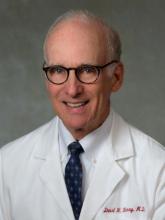Richard Finn, MD, of the Geffen School of Medicine at UCLA joins guest host Jame Abraham, MD, of the Cleveland Clinic to discuss CDK4/6 inhibitors in the treatment of breast cancer, from the first pivotal studies to efficacy and patient selection.
https://my.clevelandclinic.org/staff/18395-jame-abraham
https://www.uclahealth.org/richard-finn
Later, Ilana Yurkiewicz, MD, talks about why it’s problematic to tell patients there is no more treatment in this week’s Clinical Correlation. Dr. Yurkiewicz is a fellow in hematology and oncology at Stanford University and is also a columnist for Hematology News.
https://profiles.stanford.edu/ilana-yurkiewicz
Show notes
By Emily Bryer, DO, Resident in the department of internal medicine, University of Pennsylvania
- Cyclin dependent kinase 4 and 6 (CDK4/6) control phosphorylation of the retinoblastoma gene product in the G1 to S transition of the cell cycle.
- Luminal ER-positive HER2-negative breast cancers are most sensitive to inhibition with a CDK4/6 inhibitor and act synergistically with tamoxifen.
- PALOMA 1 trial studied CDK4/6 Inhibitors in ER-positive breast cancer.
- Letrozole alone (10-month PFS) versus letrozole plus palbociclib (greater than 20-month PFS)
- Toxicity = grade 3 (ANC 500-1000) and grade 4 neutropenia (ANC less than 500)
- Low incidence of neutropenic fever
- Palbociclib and chemotherapy have distinct effects on the bone marrow.
- Palbociclib is cytostatic (also, toxicity is predictable and not cumulative)
- Chemotherapy is cytocidal
- Although efficacy is similar between CDK4/6 inhibitors (PFS hazard ratio +/-0.5), side effects vary.
- Ribociclib and palbociclib have a higher incidence of neutropenia
- Ribociclib affects QTC interval and liver enzymes
- Abemaciclib is associated with diarrhea and venous thromboembolism
- Ongoing studies are exploring 1) CDK4/6 inhibitor plus endocrine therapy versus endocrine therapy alone and 2) CDK4/6 inhibitors in the adjuvant setting.
- The population to most benefit from CDK4/6 inhibitors may include the patients who are high-risk for relapse following endocrine therapy alone (previously those who would also receive chemotherapy).
Additional reading
- N Engl J Med 2018; 379:1926-36. https://www.nejm.org/doi/full/10.1056/NEJMoa1810527
- Breast Cancer. 2018 Jul;25(4):402-6. https://link.springer.com/article/10.1007/s12282-017-0827-3

